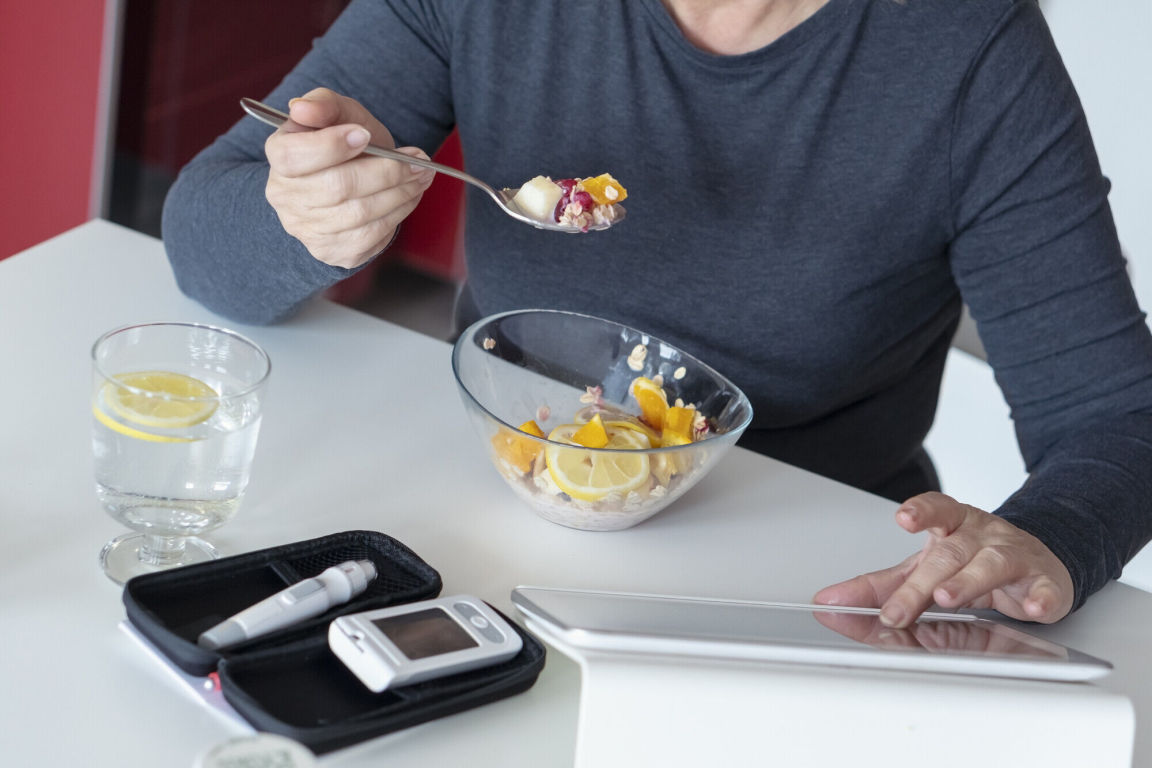It can be difficult to know what’s best to eat, without having to consider prediabetes and being a healthy weight. A healthy, balanced diet with an emphasis on foods and eating behaviours that don’t cause a spike in blood sugars is best for us all to follow.
Each of the macronutrients (carbs, protein and fat) all provide the body with energy and essential nutrients.
- Carbohydrates (bread, pasta, rice, cereal, confectionery) all raise our blood sugar levels.
- Fats (mostly dairy and meat products) containing saturated fats raise our fat levels in our blood and can negatively impact our cholesterol score. Fats that come from products like olive oil and oily fish are known as healthy fats.
Carbohydrates
Bread, pasta, rice, potatoes, chapattis, plantain, starchy veg, sugar and flours all contain carbohydrate. This is broken down into glucose and used by our cells as fuel. Carbohydrates that are higher in fibre help to keep our blood sugar levels more stable and our digestive system working well. Healthier sources of carbohydrate are:
- Whole grains like brown/basmati rice, buckwheat, whole oats.
- Fruit and non starchy vegetables.
- Pulses such as chickpeas, beans and lentils.
Carbohydrates that are known as refined or highly processed will have the biggest impact on our blood glucose levels. They are easily absorbed and broken down usually due to low fibre content.
Fruit and veg
Having pre-diabetes doesn’t mean you can’t have fruit. Fruit and veg are naturally low in calories and packed full of vitamins, minerals and fibre. They also add flavour and variety to every meal. Just a reminder that potatoes sit with starchy carbohydrates rather than vegetables, so are not counted towards 1 of your 5 a day. Having fruit with your meal is a great way to enjoy fruit as part of your daily diet, having a slower impact on your blood glucose levels, than when eaten on its own.
Protein
A healthy diet incorporates lean proteins and less red/processed meat, which are usually high in saturated fats. They can have a negative impact on your cardiovascular health. Oily fish like mackerel, salmon and sardines contain heart-protecting omega-3.
Try to incorporate different sources of protein into your diet, including pulses such as beans and lentils, eggs, white fish or oily fish like salmon/mackerel, chicken, turkey and unsalted nuts. As with most food groups, choosing a variety of protein sources will give your body everything it needs from this vital nutrient to remain healthy and strong.
Dairy and alternatives
Milk, cheese and yoghurt contain calcium and protein and are good for our bones, teeth and muscles. If choosing a lower fat version, just check that the fat hasn’t been replaced with extra sugar or salt to enhance the flavour of the product. If you opt for full fat versions, keep in mind your daily portion sizes to keep things balanced.
Fats
Fats are a vital nutrient and carry out many functions within our body. Fats that are considered healthy are known as unsaturated fats, such as oily fish, olive oil, rapseed oil, nuts (unsalted) avocados. The fats known as saturated fats include red meat and dairy products, and these should be eaten in moderation as they can have a negative impact on our blood cholesterol levels.
Processed foods
Processed foods are foods such as biscuits, crisps, chocolates, cakes, ice cream, some cereals, ready meals, some takeaways and sugary drinks. These foods are not usually nutrient dense and they don’t offer the same value to our bodies, health wise, as whole or low processed foods. They also often have hidden sugars that are hard to decipher, as well as less healthy fats, lower fibre and higher salt levels to improve flavour, shelf life and texture. These are a great place to start making changes when it comes to eating more healthily. Something simple such as replacing sugary drinks with either water, herbal/fruit teas or sugar free versions of a drink can be a great boost to your health.
Look after yourself. Taking care of your needs emotionally and physically will give you more energy and motivation to eat well. Here’s our top tips:
- Be sure to check portion sizes and food labels to be certain of the energy you’re consuming.
- Try to do regular exercise. NHS guidelines recommend 150 mins of moderate exercise per week. This helps our bodies use insulin more effectively as well as promoting overall fitness and weight loss.
- Create a good sleep routine.
- Manage stress and give yourself time for you.
It can be tricky managing pre-diabetes. Sometimes you won’t know all the answers and that’s ok. Be kind to yourself and ask for help from your GP or practise nurse.



